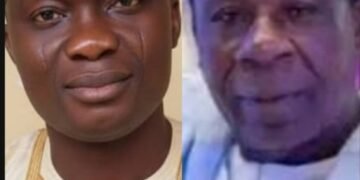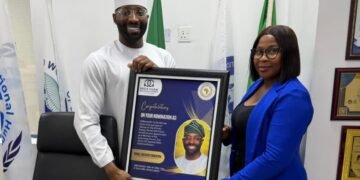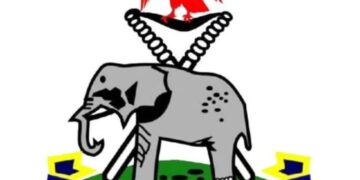Kofi Atta Annan was born April 8, 1938, into an elite family in Kumasi, Ghana, the son of a provincial governor and grandson of two tribal chiefs.
He shared his middle name Atta — “twin” in Ghana’s Akan language — with a twin sister, Efua.
He became fluent in English, French and several African languages, attending an elite boarding school and the University of Science and Technology in Kumasi.
He finished his undergraduate work in economics at Macalester College in St. Paul, Minnesota, in 1961. From there he went to Geneva, where he began his graduate studies in international affairs and launched his U.N. career.
Annan married Titi Alakija, a Nigerian woman, in 1965, and they had a daughter, Ama, and a son, Kojo. He returned to the U.S. in 1971 and earned a master’s degree at the Massachusetts Institute of Technology’s Sloan School of Management. The couple separated during the 1970s and, while working in Geneva, Annan met his second wife, Swedish lawyer Nane Lagergren. They married in 1984.
Annan worked for the U.N. Economic Commission for Africa in Ethiopia, its Emergency Force in Egypt and the office of the High Commissioner for Refugees in Geneva before taking a series of senior posts at U.N. headquarters in New York dealing with human resources, budget, finance and staff security.
He also had special assignments. After Iraq invaded Kuwait in 1990, he facilitated the repatriation from Iraq of more than 900 international staff and other non-Iraqi nationals, and the release of Western hostages in Iraq. He led the initial negotiations with Iraq for the sale of oil in exchange for humanitarian relief.
Just before becoming secretary-general, Annan served as U.N. peacekeeping chief and as special envoy to the former Yugoslavia, where he oversaw a transition in Bosnia from U.N. protective forces to NATO-led troops.
The U.N. peacekeeping operation faced two of its greatest failures during his tenure: the Rwanda genocide in 1994 and the massacre in the Bosnian town of Srebrenica in July 1995.
In both cases, the U.N. had deployed troops under Annan’s command, but they failed to save the lives of the civilians they were mandated to protect. Annan offered apologies but ignored calls to resign by U.S. Republican lawmakers. After becoming secretary-general, he called for U.N. reports on those two debacles — and they were highly critical of his management.
As secretary-general, Annan forged his experiences into a doctrine called the “Responsibility to Protect” that countries accepted — at least in principle — to head off genocide, crimes against humanity, ethnic cleansing and war crimes.
Annan sought to strengthen the U.N.’s management, coherence and accountability, efforts that required huge investments in training and technology, a new whistleblower policy and financial disclosure requirements.
In 1998, he helped ease a transition to civilian rule in Nigeria and visited Iraq to try to resolve its impasse with the Security Council over compliance with weapons inspections and other matters. The effort helped avoid an outbreak of hostilities that seemed imminent at the time.
In 1999, he was deeply involved in the process by which East Timor gained independence from Indonesia, and started the “Global Compact” initiative that has grown into the world’s largest effort to promote corporate social responsibility.
Annan was chief architect of what became known as the Millennium Development Goals, and played a central role in creating the Global Fund to Fight AIDS, Tuberculosis and Malaria and the U.N.’s first counter-terrorism strategy.
Annan’s uncontested election to a second term was unprecedented, reflecting the overwhelming support he enjoyed from both rich and poor countries. Timothy Wirth, president of the United Nations Foundation, which disburses Ted Turner’s $1 billion pledge to U.N. causes, hailed “a saint-like sense about him.”
In 2005, Annan succeeded in establishing the Peacebuilding Commission and the Human Rights Council. But that year, the U.N. was facing almost daily attacks over allegations about corruption in the U.N. oil-for-food program in Iraq, bribery by U.N. purchasing officials and widespread sex abuse by U.N. peacekeepers — an issue that would only balloon in importance after he left office.
It emerged that Annan’s son had not disclosed payments he received from his employer, which had a $10 million-a-year contract to monitor humanitarian aid under the oil-for-food program. The company paid at least $300,000 to Kojo so he would not work for competitors after he left.
An independent report criticized the secretary-general for being too complacent, saying he should have done more to investigate matters even if he was not involved with the awarding of the contract.
World leaders agreed to create an internal U.N. ethics office, but a major overhaul of the U.N.’s outdated management practices and operating procedures was left to Annan’s successor, Ban Ki-moon.
Before leaving office, Annan helped secure a truce between Israel and Hezbollah in 2006, and mediated a settlement of a dispute between Cameroon and Nigeria over the Bakassi peninsula.
At a farewell news conference, Annan listed as top achievements the promotion of human rights, the fight to close the gap between extreme poverty and immense wealth and the U.N. campaign to fight infectious diseases like AIDS.
He never took disappointments and setbacks personally. And he kept his view that diplomacy should take place in private and not in the public forum.
In his memoir, Annan recognized the costs of taking on the world’s top diplomatic job, joking that “SG,” for secretary-general, also signified “scapegoat” around U.N. headquarters.
Former U.S. ambassador to the United Nations Richard Holbrooke called Annan “an international rock star of diplomacy.”
After leaving his high-profile U.N. perch, Annan didn’t let up. In 2007, his Geneva-based foundation was created. That year he helped broker peace in Kenya, where election violence had killed over 1,000 people.
He also joined The Elders, an elite group of former leaders founded by Nelson Mandela, eventually succeeding Desmond Tutu as its chairman.
Annan “represented our continent and the world with enormous graciousness, integrity and distinction,” Tutu said Saturday in a statement, adding that “we give great thanks to God” for him.
As special envoy to Syria in 2012, Annan won international backing for a six-point plan for peace. The U.N. deployed a 300-member observer force to monitor a cease-fire, but peace never took hold and Annan was unable to surmount the bitter stalemate among Security Council powers. He resigned in frustration seven months into the job, as the civil war raged on.
Annan continued to crisscross the globe. In 2017, his foundation’s biggest projects included promotion of fair, peaceful elections; work with Myanmar’s government to improve life in troubled Rakhine state; and battling violent extremism by enlisting young people to help.
He also remained a vocal commentator on troubles like the refugee crisis; promoted good governance, anti-corruption measures and sustainable agriculture in Africa; and pushed efforts in the fight against illegal drug trafficking.
Like many in the international community he expressed alarm at the Trump administration’s decisions to back out of the Iran nuclear deal and move the U.S. Embassy in Israel to Jerusalem.
Annan retained connections to many international organizations. He was chancellor of the University of Ghana, a fellow at New York’s Columbia University, and professor at the Lee Kuan Yew School of Public Policy in Singapore.
His homeland of Ghana was shaken by his death. “One of our greatest compatriots,” President Nana Akufo-Addo said, calling for a week with flags at half-staff. “Rest in perfect peace, Kofi. You have earned it.”
Annan is survived by his wife and three children. Funeral arrangements weren’t immediately announced.
___
Heilprin reported from Geneva. Associated Press writer Frank Jordans in Berlin contributed.













